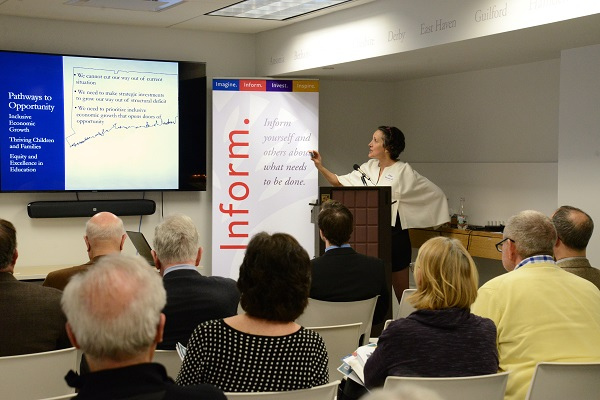Donor Briefing: The State Budget and Pathways to Opportunity
Connecticut Voices for Children's analysis of the Connecticut economy and the status of our state budget.
The Community Foundation hosted its first Donor Briefing of 2018: The State Budget and Pathways to Opportunity. The Foundation's donor briefing series invites guest experts to discuss important issues affecting our community and inform us about what can be done.
 |
| "Companies are not leaving Connecticut because of taxes. They are leaving because of a failure to invest." Ellen Shemitz |
Last week, guest speaker Ellen Shemitz, Executive Director of Connecticut Voices for Children, presented an analysis of the Connecticut economy and the status of our state budget. She raised concerns about new fiscal restrictions that limit the legislature's ability to invest in the state's future.
What We Heard
The State of the Economy
Connecticut's economy, both in terms of jobs and gross domestic product (GDP), has effectively stagnated since the Great Recession, while every neighboring state has seen higher growth.
The State of the Budget
Slowing tax revenues and rising non-functional costs in pensions, health care and debt liabilities are creating a state budget that, absent structural changes, will remain imbalanced for the foreseeable future.
Fiscal restrictions agreed to during recent budget sessions limit the state's ability to invest in education, transportation and other public improvements needed to attract new businesses and opportunity for the next generation.
- A Spending Cap requires that the 2019 budget can increase no more than1% above present appropriations.
- A Volatility Cap requires any additional income tax revenue be locked in a Rainy Day Fund.
- A Bond Lock, beginning in May 2018, requires the state, when it issues bonds, to contractually promise that it will not change the spending cap or volatility cap for the next 10 years, tying the hands of future legislators and ensuring austerity budgets.
Pathways to Opportunity
- We cannot cut our way out of our current situation.
- We need strategic investments that prioritize inclusive economic growth.
What We Can Do
- Contact your legislators about the bond lock. Tell them you are concerned it's going to hurt our ability to invest in the kinds of services we need for our future. Ask them if they are committed to voting against the bond lock.
- Join us as we launch our Agenda of Inclusive Growth and Opportunity at our Annual Meeting on April 19, featuring Amy Liu, Vice President and Director of the Metropolitan Policy Program at Brookings.
Did you know?
The so-called "millionaire migration" is frequently used as a reason to prevent any discussion around raising the state income tax in order for the state to improve its fiscal health and invest in its economy. The claim is that Connecticut's taxes are so high that a significant number of its wealthiest residents are moving to low-tax states.
In fact twelve states and Washington D.C. all have higher income-tax rates than Connecticut and the number of high income taxpayers in Connecticut is growing.
Additional Links and Resources
- The State Budget and Pathways to Opportunity Connecticut Voices for Children PowerPoint presentation
- Fact sheet on the bond lock
- More resources from Connecticut Voices about the state budget
- Inclusive Growth: Shared Prosperity and Opportunity for the Next Generation
